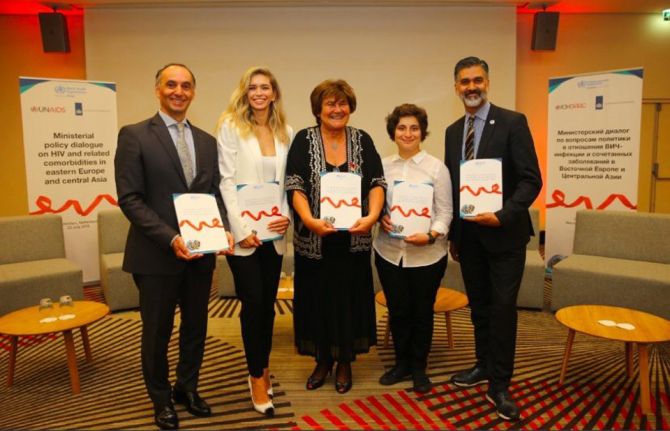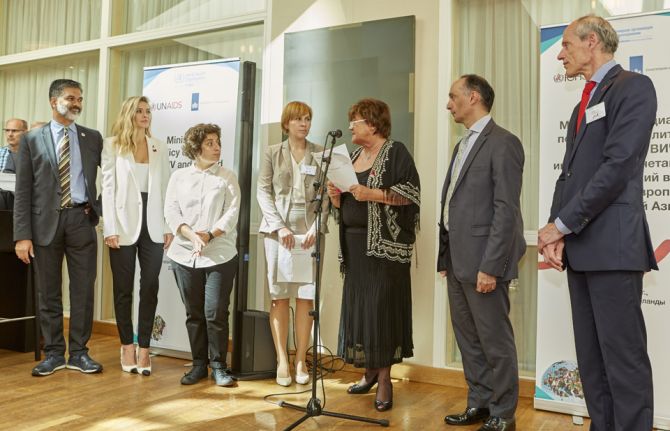


Feature Story
Health leaders from 10 countries in eastern Europe and central Asia reaffirm commitment to scale up the AIDS response
24 July 2018
24 July 2018 24 July 2018Ministers of health and senior policy-makers from 10 countries in eastern Europe and central Asia reaffirmed their political commitment to scale up national HIV responses during a ministerial policy dialogue on HIV, which was held on the eve of the International AIDS Conference in Amsterdam, Netherlands.
The participants exchanged their experiences and the results of their national AIDS responses with a view to adapting them and scaling them up across the region. They discussed the Fast-Track priorities for achieving the 90–90–90 targets, whereby, by 2020, 90% of people living with HIV will know their HIV status, 90% of people who know their HIV-positive status will be accessing treatment and 90% of people on treatment will have suppressed viral loads. The Fast-Track priorities include the scale-up of domestic funding, the continued focus on key populations, strengthening collaboration across sectors and working in partnership with civil society and people living with HIV.
According to the recent UNAIDS report Miles to go, in eastern Europe and central Asia the annual number of new HIV infections has doubled since 2010—one of the only regions of the world in which HIV continues to increase.
Stigma and discrimination discourages HIV testing and treatment uptake. Harm reduction services remain essential in a region where nearly one third of new HIV infections are among people who inject drugs. Harm reduction programmes are in place across the region, but often at a limited scale.
At the end of 2017, among the 1.4 million people living with HIV in eastern Europe and central Asia, 73% were aware of their HIV status, an increase from 69% in 2016. A majority of the countries in the region have officially adopted test and treat, but owing to resource constraints and barriers to treatment among key populations, the pace of treatment scale-up is slow and coverage remains among the lowest in the world. About 520 000 people were accessing antiretroviral therapy in 2017, just 36% of all people living with HIV in the region.
During the dialogue, the Compendium of good practices in the health sector response to HIV in the WHO European region, featuring 52 successful examples from 32 countries, was launched.
The dialogue was organized by the World Health Organization Regional Office for Europe and UNAIDS, in cooperation with the Government of the Netherlands.
Quotes
“The time to accelerate our efforts is now. We have done much, but we have not done it all. When there are evidence-based approaches to change the course of the HIV epidemic in our region, we cannot afford business as usual.”
“We need ministers of health to convince heads of state and government to meet with people living with HIV and support key populations in order to set an example on how to end stigma and discrimination.”
“I am impressed to see an unprecedented number of ministers of health here at the International AIDS Conference. Let’s maintain this momentum after Amsterdam to get public leaders in your countries to enhance the momentum to reverse the HIV epidemic in countries across eastern Europe and central Asia.”
“Young people across eastern Europe and central Asia are calling on ministers of health to engage and empower young people in all aspects of policy development and implementation.”
“An inclusive rights- and evidence-based HIV response is cost-effective. At today’s dialogue here in Amsterdam, with the unprecedented participation of health ministries, experiences were exchanged and results discussed. Let’s use good practices as an example and scale them up to ensure an effective and inclusive response.”
Region/country
- Eastern Europe and Central Asia
- Albania
- Armenia
- Azerbaijan
- Belarus
- Bosnia and Herzegovina
- Bulgaria
- Croatia
- Cyprus
- Czechia
- Estonia
- Georgia
- Hungary
- Kazakhstan
- Kyrgyzstan
- Latvia
- Lithuania
- Montenegro
- Poland
- Republic of Moldova
- Romania
- Russian Federation
- Serbia
- Slovakia
- Slovenia
- Tajikistan
- North Macedonia
- Türkiye
- Turkmenistan
- Ukraine
- Uzbekistan


